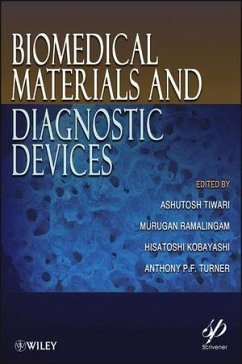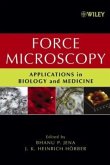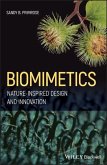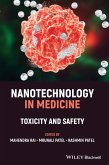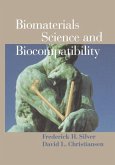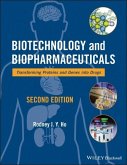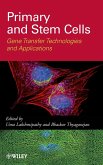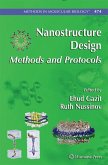Biomedical Materials and Diagnostic Devices
Herausgegeben von Ramalingam, Murugan; Kobayashi, Hisashi; Turner, Anthony P. F.
Biomedical Materials and Diagnostic Devices
Herausgegeben von Ramalingam, Murugan; Kobayashi, Hisashi; Turner, Anthony P. F.
- Gebundenes Buch
- Merkliste
- Auf die Merkliste
- Bewerten Bewerten
- Teilen
- Produkt teilen
- Produkterinnerung
- Produkterinnerung
The functional materials with the most promising outlook have the ability to precisely adjust the biological phenomenon in a controlled mode. Engineering of advanced bio- materials has found striking applications in used for biomedical and diagnostic device applications, such as cell separation, stem-cell, drug delivery, hyperthermia, automated DNA extraction, gene targeting, resonance imaging, biosensors, tissue engineering and organ regeneration.
Andere Kunden interessierten sich auch für
![Force Microscopy Force Microscopy]() Bhanu P. Jena / Johann Karl H. Hoerber (eds.)Force Microscopy262,99 €
Bhanu P. Jena / Johann Karl H. Hoerber (eds.)Force Microscopy262,99 €![Biomimetics Biomimetics]() Sandy B. PrimroseBiomimetics107,99 €
Sandy B. PrimroseBiomimetics107,99 €![Nanotechnology in Medicine Nanotechnology in Medicine]() Nanotechnology in Medicine184,99 €
Nanotechnology in Medicine184,99 €![Biomaterials Science and Biocompatibility Biomaterials Science and Biocompatibility]() Frederick H. SilverBiomaterials Science and Biocompatibility41,99 €
Frederick H. SilverBiomaterials Science and Biocompatibility41,99 €![Biotechnology and Biopharmaceuticals Biotechnology and Biopharmaceuticals]() Rodney J. Y. HoBiotechnology and Biopharmaceuticals197,99 €
Rodney J. Y. HoBiotechnology and Biopharmaceuticals197,99 €![Primary and Stem Cells Primary and Stem Cells]() Uma LakshmipathyPrimary and Stem Cells155,99 €
Uma LakshmipathyPrimary and Stem Cells155,99 €![Nanostructure Design Nanostructure Design]() Ehud Gazit (ed.)Nanostructure Design81,99 €
Ehud Gazit (ed.)Nanostructure Design81,99 €-
-
-
The functional materials with the most promising outlook have the ability to precisely adjust the biological phenomenon in a controlled mode. Engineering of advanced bio- materials has found striking applications in used for biomedical and diagnostic device applications, such as cell separation, stem-cell, drug delivery, hyperthermia, automated DNA extraction, gene targeting, resonance imaging, biosensors, tissue engineering and organ regeneration.
Hinweis: Dieser Artikel kann nur an eine deutsche Lieferadresse ausgeliefert werden.
Hinweis: Dieser Artikel kann nur an eine deutsche Lieferadresse ausgeliefert werden.
Produktdetails
- Produktdetails
- Verlag: Wiley & Sons
- 1. Auflage
- Seitenzahl: 640
- Erscheinungstermin: 9. Oktober 2012
- Englisch
- Abmessung: 257mm x 183mm x 38mm
- Gewicht: 1225g
- ISBN-13: 9781118030141
- ISBN-10: 1118030141
- Artikelnr.: 35063971
- Herstellerkennzeichnung
- Libri GmbH
- Europaallee 1
- 36244 Bad Hersfeld
- gpsr@libri.de
- Verlag: Wiley & Sons
- 1. Auflage
- Seitenzahl: 640
- Erscheinungstermin: 9. Oktober 2012
- Englisch
- Abmessung: 257mm x 183mm x 38mm
- Gewicht: 1225g
- ISBN-13: 9781118030141
- ISBN-10: 1118030141
- Artikelnr.: 35063971
- Herstellerkennzeichnung
- Libri GmbH
- Europaallee 1
- 36244 Bad Hersfeld
- gpsr@libri.de
Ashutosh Tiwari is an assistant professor of nanobioelectronics at Biosensors and Bioelectronics Centre, IFM-Linköping University, Sweden, as well as Editor-in-Chief of Advanced Materials Letters. He has published more than 125 articles and patents as well as authored/edited books in the field of materials science and technology. Murugan Ramalingam is an associate professor of biomaterials and tissue engineering at the Institut National de la Santé et de la Recherche Médicale, Université de Strasbourg (UdS), France. Concurrently, he holds an adjunct associate professorship at Tohoku University, Japan. He has authored more than 125 publications and is Editor-in-Chief of Journal of Bionanoscience and Journal of Biomaterials and Tissue Engineering. Hisatoshi Kobayashi is group leader of Biofunctional Materials at Biomaterials Centre, National Institute for Materials Science, Japan. He has published more than 150 publications, books and patents in the field of biomaterials science and technology, as well as edited/authored three books on the advanced state-of-the-art of biomaterials. Professor Anthony P. F. Turner is currently Head of Division, FM-Linköping University's new Centre for Biosensors and Bioelectronics. His previous thirty-five-year academic career in the United Kingdom culminated in the positions of Principal (Rector) of Cranfield University and Distinguished Professor of Biotechnology. Professor Turner has more than 600 publications and patents in the field of biosensors and biomimetic sensors and is best known for his role in the development of glucose sensors for home-use by people with diabetes. He published the first textbook on Biosensors in 1987 and is Editor-In-Chief of the principal journal in his field, Biosensors & Bioelectronics, which he cofounded in 1985.
Preface xv
Part I: Biomedical Materials
1. Application of the Collagen as Biomaterials 3
Kwangwoo Nam and Akio Kishida
1.1 Introduction 3
1.2 Structural Aspect of Native Tissue 5
1.3 Processing of Collagen Matrix 8
1.4 Conclusions and Future Perspectives 14
2. Biological and Medical Significance of Nanodimensional and
Nanocrystalline Calcium Orthophosphates 19
Sergey V. Dorozhkin
2.1 Introduction 19
2.2 General Information on ?Nano? 21
2.3 Micron- and Submicron-Sized Calcium Orthophosphates versus the
Nanodimensional Ones 23
2.4 Nanodimensional and Nanocrystalline Calcium Orthophosphates in
Calcified Tissues of Mammals 26
2.5 The Structure of the Nanodimensional and Nanocrystalline Apatites 28
2.6 Synthesis of the Nanodimensional and Nanocrystalline Calcium
Orthophosphates 34
2.7 Biomedical Applications of the Nanodimensional and Nanocrystalline
Calcium Orthophosphates 47
2.8 Other Applications of the Nanodimensional and Nanocrystalline Calcium
Orthophosphates 58
2.9 Summary and Perspectives 58
2.10 Conclusions 61
3. Layer-by-Layer (LbL) Thin Film: From Conventional To Advanced Biomedical
and Bioanalytical Applications 101
Wing Cheung MAK
3.1 State-of-the-art LbL Technology 101
3.2 Principle of Biomaterials Based Lbl Architecture 102
3.3 LbL Thin Film for Biomaterials and Biomedical Implantations 103
3.4 LbL Thin Film for Biosensors and Bioassays 105
3.5 LbL Thin Film Architecture on Colloidal Materials 107
3.6 LbL Thin Film for Drug Encapsulation and Delivery 108
3.7 LbL Thin Film Based Micro/Nanoreactor 110
4. Polycaprolactone based Nanobiomaterials 115
Narendra K. Singh and Pralay Maiti
4.1 Introduction 115
4.2 Preparation of Polycaprolactone Nanocomposites 118
4.3 Characterization of Poly(caprolactone) Nanocomposites 119
4.4 Properties 123
4.5 Biocompatibility and Drug Delivery Application 141
4.6 Conclusion 150 Acknowledgement 150
5. Bone Substitute Materials in Trauma and Orthopedic Surgery ? Properties
and Use in Clinic 157
Esther M.M. Van Lieshout
5.1 Introduction 158
5.2 Types of Bone Grafts 159
5.3 Bone Substitute Materials 161
5.4 Combinations with Osteogenic and Osteoinductive Materials 171
5.5 Discussion and Conclusion 173
6. Surface Functionalized Hydrogel Nanoparticles 191
Mehrdad Hamidi, Hajar Ashrafi and Amir Azadi
6.1 Hydrogel Nanoparticles 191
6.2 Hydrogel Nanoparticles Based on Chitosan 193
6.3 Hydrogel Nanoparticles Based on Alginate 194
6.4 Hydrogel Nanoparticles Based on Poly(vinyl Alcohol) 195
6.5 Hydrogel Nanoparticles Based on Poly(ethylene Oxide) and
Poly(ethyleneimine) 196
6.6 Hydrogel Nanoparticles Based on Poly(vinyl Pyrrolidone) 198
6.7 Hydrogel Nanoparticles Based on Poly-N-Isopropylacrylamide 198
6.8 Smart Hydrogel Nanoparticles 199
6.9 Self-assembled Hydrogel Nanoparticles 200
6.10 Surface Functionalization 201
6.11 Surface Functionalized Hydrogel Nanoparticles 205
Part II: Diagnostic Devices
7. Utility and Potential Application of Nanomaterials in Medicine 215
Ravindra P. Singh, Jeong -Woo Choi, Ashutosh Tiwari and Avinash Chand
Pandey
7.1 Introduction 215
7.2 Nanoparticle Coatings 218
7.3 Cyclic Peptides 220
7.4 Dendrimers 221
7.5 Fullerenes/Carbon Nanotubes/Graphene 227
7.6 Functional Drug Carriers 229
7.7 MRI Scanning Nanoparticles 233
7.8 Nanoemulsions 235
7.9 Nanofibers 236
7.10 Nanoshells 239
7.11 Quantum Dots 240
7.12 Nanoimaging 248
7.13 Inorganic Nanoparticles 248
7.14 Conclusion 250
8. Gold Nanoparticle-based Electrochemical Biosensors for Medical
Applications 261
Ülkü Anik
8.1 Introduction 261
8.2 Electrochemical Biosensors 262
8.3 Conclusion 272
9. Impedimetric DNA Sensing Employing Nanomaterials 277
Manel del Valle and Alessandra Bonanni
9.1 Introduction 277
9.2 Electrochemical Impedance Spectroscopy for Genosensing 280
9.3 Nanostructured Carbon Used in Impedimetric Genosensors 286
9.4 Nanostructured Gold Used in Impedimetric Genosensors 290
9.5 Quantum Dots for Impedimetric Genosensing 293
9.6 Impedimetric Genosensors for Point-of-Care Diagnosis 293
9.7 Conclusions (Past, Present and Future Perspectives) 294
10. Bionanocomposite Matrices in Electrochemical Biosensors 301
Ashutosh Tiwari, Atul Tiwari
10.1 Introduction 301
10.2 Fabricationof SiO2-CHIT/CNTs Bionanocomposites 303
10.3 Preparation of Bioelectrodes 304
10.4 Characterizations 305
10.5 Electrocatalytic Properties 307
10.6 Photometric Response 315
10.7 Conclusions 316
11. Biosilica? Nanocomposites - Nanobiomaterials for Biomedical Engineering
and Sensing Applications 321
Nikos Chaniotakis, Raluca Buiculescu
11.1 Introduction 321
11.2 Silica Polymerization Process 323
11.3 Biocatalytic Formation of Silica 325
11.4 Biosilica Nanotechnology 327
11.5 Applications 328
11.6 Conclusions 334
12. Molecularly Imprinted Nanomaterial-based Highly Sensitive and Selective
Medical Devices 337
Bhim Bali Prasad and Mahavir Prasad Tiwari
12.1 Introduction 337
12.2 Molecular Imprinted Polymer Technology 340
12.3 Molecularly Imprinted Nanomaterials 360
12.4 Molecularly Imprinted Nanomaterial-based Sensing Devices 362
12.5 Conclusion 379
13. Immunosensors for Diagnosis of Cardiac Injury 391
Swapneel R. Deshpande, Aswathi Anto Antony, Ashutosh Tiwari, Emilia
Wiechec, Ulf Dahlström, Anthony P.F. Turner
13.1 Immunosensor 391
13.2 Myocardial Infarction and Cardiac Biomarkers 392
13.3 Immunosensors for Troponin 399
13.4 Conclusions 404
Part III: Drug Delivery and Therapeutics
14. Ground-Breaking Changes in Mimetic and Novel Nanostructured Composites
for Intelligent-, Adaptive- and In vivo-responsive Drug Delivery Therapies
411
Dipak K. Sarker
14. 1 Introduction 411
14.2 Obstacles to the Clinician 420
14.3 Hurdles for the Pharmaceuticist 428
14.4 Nanostructures 431
14.5 Surface Coating 435
14.7 Formulation Conditions and Parameters 439
14.8 Delivery Systems 440
14.9 Evaluation 443
14.10 Conclusions 447
15. Progress of Nanobiomaterials for Theranostic Systems 451
Dipendra Gyawali, Michael Palmer, Richard T. Tran and Jian Yang
15.1 Introduction 451
15.2 Design Concerns for Theranostic Nanosystems 456
15.3 Designing a Smart and Functional Theranostic System 459
15.4 Materials for Theranostic System 462
15.5 Theranostic Systems and Applications 474
15.6 Future Outlook 481
16. Intelligent Drug Delivery Systems for Cancer Therapy 493
Mousa Jafari, Bahram Zargar, M. Soltani, D. Nedra Karunaratne, Brian
Ingalls, P. Chen
16.1 Introduction 493
16.2 Peptides for Nucleic Acid and Drug Delivery in Cancer Therapy 494
16.3 Lipid Carriers 499
16.4 Polymeric Carriers 506
16.5 Bactria Mediated Cancer Therapy 514
16.6 Conclusion 519
Part IV: Tissue Engineering and Organ Regeneration 531
17. The Evolution of Abdominal Wall Reconstruction and the Role of
Nonobiotecnology in the Development of Intelligent Abdominal Wall Mesh 533
Cherif Boutros, Hany F. Sobhi and Nader Hanna
17.1 The Complex Structure of the Abdominal Wall 534
17.2 Need for Abdominal Wall Reconstruction 535
17.3 Failure of Primary Repair 535
17.4 Limitations of the Synthetic Meshes 536
17.5 Introduction of Biomaterials To Overcome Synthetic Mesh Limitations
537
17.6 Ideal Material for Abdominal Wall Reconstruction 538
17.7 Role of Bionanotechnology in Providing the
17.7 Future Directions 542
18. Poly(Polyol Sebacate)-based Elastomeric Nanobiomaterials for Soft
Tissue Engineering 545
Qizhi Chen
18.1 Introduction 545
18.2 Poly(polyol sebacate) Elastomers 547
18.3 Elastomeric Nanocomposites 562
18.4 Summary 569
19. Electrospun Nanomatrix for Tissue Regeneration 577
Debasish Mondal and Ashutosh Tiwari
19.1 Introduction 577
19.2 Electrosun Nanomatrix 578
19.3 Polymeric Nanomatrices for Tissue Engineering 580
19.4 Biocompatibility of the Nanomatrix 581
19.5 Electrospun Nanomatrices for Tissue Engineering 583
19.6 Status and Prognosis 592
20. Conducting Polymer Composites for Tissue Engineering Scaffolds 597
Yashpal Sharma, Ashutosh Tiwari and Hisatoshi Kobayashi
20.1 Introduction 598
20.3 Synthesis of Conducting Polymers 599
20.4 Application of Conducting Polymer in Tissue Engineering 600
20.5 Polypyrrole 600
20.6 Poly(3,4-ethylene dioxythiophene) 602
20.7 Polyaniline 603
20.8 Carbon Nanotube 605
20.9 Future Prospects and Conclusions 607
21. Cell Patterning Technologies for Tissue Engineering 611
Azadeh Seidi and Murugan Ramalingam
21.1 Introduction 611
21.2 Patterned Co-culture Techniques 612
21.3 Applications of Co-cultures in Tissue Engineering 618
21.4 Concluding Remarks 619
Acknowledgements 619
References 620
Index 000
Part I: Biomedical Materials
1. Application of the Collagen as Biomaterials 3
Kwangwoo Nam and Akio Kishida
1.1 Introduction 3
1.2 Structural Aspect of Native Tissue 5
1.3 Processing of Collagen Matrix 8
1.4 Conclusions and Future Perspectives 14
2. Biological and Medical Significance of Nanodimensional and
Nanocrystalline Calcium Orthophosphates 19
Sergey V. Dorozhkin
2.1 Introduction 19
2.2 General Information on ?Nano? 21
2.3 Micron- and Submicron-Sized Calcium Orthophosphates versus the
Nanodimensional Ones 23
2.4 Nanodimensional and Nanocrystalline Calcium Orthophosphates in
Calcified Tissues of Mammals 26
2.5 The Structure of the Nanodimensional and Nanocrystalline Apatites 28
2.6 Synthesis of the Nanodimensional and Nanocrystalline Calcium
Orthophosphates 34
2.7 Biomedical Applications of the Nanodimensional and Nanocrystalline
Calcium Orthophosphates 47
2.8 Other Applications of the Nanodimensional and Nanocrystalline Calcium
Orthophosphates 58
2.9 Summary and Perspectives 58
2.10 Conclusions 61
3. Layer-by-Layer (LbL) Thin Film: From Conventional To Advanced Biomedical
and Bioanalytical Applications 101
Wing Cheung MAK
3.1 State-of-the-art LbL Technology 101
3.2 Principle of Biomaterials Based Lbl Architecture 102
3.3 LbL Thin Film for Biomaterials and Biomedical Implantations 103
3.4 LbL Thin Film for Biosensors and Bioassays 105
3.5 LbL Thin Film Architecture on Colloidal Materials 107
3.6 LbL Thin Film for Drug Encapsulation and Delivery 108
3.7 LbL Thin Film Based Micro/Nanoreactor 110
4. Polycaprolactone based Nanobiomaterials 115
Narendra K. Singh and Pralay Maiti
4.1 Introduction 115
4.2 Preparation of Polycaprolactone Nanocomposites 118
4.3 Characterization of Poly(caprolactone) Nanocomposites 119
4.4 Properties 123
4.5 Biocompatibility and Drug Delivery Application 141
4.6 Conclusion 150 Acknowledgement 150
5. Bone Substitute Materials in Trauma and Orthopedic Surgery ? Properties
and Use in Clinic 157
Esther M.M. Van Lieshout
5.1 Introduction 158
5.2 Types of Bone Grafts 159
5.3 Bone Substitute Materials 161
5.4 Combinations with Osteogenic and Osteoinductive Materials 171
5.5 Discussion and Conclusion 173
6. Surface Functionalized Hydrogel Nanoparticles 191
Mehrdad Hamidi, Hajar Ashrafi and Amir Azadi
6.1 Hydrogel Nanoparticles 191
6.2 Hydrogel Nanoparticles Based on Chitosan 193
6.3 Hydrogel Nanoparticles Based on Alginate 194
6.4 Hydrogel Nanoparticles Based on Poly(vinyl Alcohol) 195
6.5 Hydrogel Nanoparticles Based on Poly(ethylene Oxide) and
Poly(ethyleneimine) 196
6.6 Hydrogel Nanoparticles Based on Poly(vinyl Pyrrolidone) 198
6.7 Hydrogel Nanoparticles Based on Poly-N-Isopropylacrylamide 198
6.8 Smart Hydrogel Nanoparticles 199
6.9 Self-assembled Hydrogel Nanoparticles 200
6.10 Surface Functionalization 201
6.11 Surface Functionalized Hydrogel Nanoparticles 205
Part II: Diagnostic Devices
7. Utility and Potential Application of Nanomaterials in Medicine 215
Ravindra P. Singh, Jeong -Woo Choi, Ashutosh Tiwari and Avinash Chand
Pandey
7.1 Introduction 215
7.2 Nanoparticle Coatings 218
7.3 Cyclic Peptides 220
7.4 Dendrimers 221
7.5 Fullerenes/Carbon Nanotubes/Graphene 227
7.6 Functional Drug Carriers 229
7.7 MRI Scanning Nanoparticles 233
7.8 Nanoemulsions 235
7.9 Nanofibers 236
7.10 Nanoshells 239
7.11 Quantum Dots 240
7.12 Nanoimaging 248
7.13 Inorganic Nanoparticles 248
7.14 Conclusion 250
8. Gold Nanoparticle-based Electrochemical Biosensors for Medical
Applications 261
Ülkü Anik
8.1 Introduction 261
8.2 Electrochemical Biosensors 262
8.3 Conclusion 272
9. Impedimetric DNA Sensing Employing Nanomaterials 277
Manel del Valle and Alessandra Bonanni
9.1 Introduction 277
9.2 Electrochemical Impedance Spectroscopy for Genosensing 280
9.3 Nanostructured Carbon Used in Impedimetric Genosensors 286
9.4 Nanostructured Gold Used in Impedimetric Genosensors 290
9.5 Quantum Dots for Impedimetric Genosensing 293
9.6 Impedimetric Genosensors for Point-of-Care Diagnosis 293
9.7 Conclusions (Past, Present and Future Perspectives) 294
10. Bionanocomposite Matrices in Electrochemical Biosensors 301
Ashutosh Tiwari, Atul Tiwari
10.1 Introduction 301
10.2 Fabricationof SiO2-CHIT/CNTs Bionanocomposites 303
10.3 Preparation of Bioelectrodes 304
10.4 Characterizations 305
10.5 Electrocatalytic Properties 307
10.6 Photometric Response 315
10.7 Conclusions 316
11. Biosilica? Nanocomposites - Nanobiomaterials for Biomedical Engineering
and Sensing Applications 321
Nikos Chaniotakis, Raluca Buiculescu
11.1 Introduction 321
11.2 Silica Polymerization Process 323
11.3 Biocatalytic Formation of Silica 325
11.4 Biosilica Nanotechnology 327
11.5 Applications 328
11.6 Conclusions 334
12. Molecularly Imprinted Nanomaterial-based Highly Sensitive and Selective
Medical Devices 337
Bhim Bali Prasad and Mahavir Prasad Tiwari
12.1 Introduction 337
12.2 Molecular Imprinted Polymer Technology 340
12.3 Molecularly Imprinted Nanomaterials 360
12.4 Molecularly Imprinted Nanomaterial-based Sensing Devices 362
12.5 Conclusion 379
13. Immunosensors for Diagnosis of Cardiac Injury 391
Swapneel R. Deshpande, Aswathi Anto Antony, Ashutosh Tiwari, Emilia
Wiechec, Ulf Dahlström, Anthony P.F. Turner
13.1 Immunosensor 391
13.2 Myocardial Infarction and Cardiac Biomarkers 392
13.3 Immunosensors for Troponin 399
13.4 Conclusions 404
Part III: Drug Delivery and Therapeutics
14. Ground-Breaking Changes in Mimetic and Novel Nanostructured Composites
for Intelligent-, Adaptive- and In vivo-responsive Drug Delivery Therapies
411
Dipak K. Sarker
14. 1 Introduction 411
14.2 Obstacles to the Clinician 420
14.3 Hurdles for the Pharmaceuticist 428
14.4 Nanostructures 431
14.5 Surface Coating 435
14.7 Formulation Conditions and Parameters 439
14.8 Delivery Systems 440
14.9 Evaluation 443
14.10 Conclusions 447
15. Progress of Nanobiomaterials for Theranostic Systems 451
Dipendra Gyawali, Michael Palmer, Richard T. Tran and Jian Yang
15.1 Introduction 451
15.2 Design Concerns for Theranostic Nanosystems 456
15.3 Designing a Smart and Functional Theranostic System 459
15.4 Materials for Theranostic System 462
15.5 Theranostic Systems and Applications 474
15.6 Future Outlook 481
16. Intelligent Drug Delivery Systems for Cancer Therapy 493
Mousa Jafari, Bahram Zargar, M. Soltani, D. Nedra Karunaratne, Brian
Ingalls, P. Chen
16.1 Introduction 493
16.2 Peptides for Nucleic Acid and Drug Delivery in Cancer Therapy 494
16.3 Lipid Carriers 499
16.4 Polymeric Carriers 506
16.5 Bactria Mediated Cancer Therapy 514
16.6 Conclusion 519
Part IV: Tissue Engineering and Organ Regeneration 531
17. The Evolution of Abdominal Wall Reconstruction and the Role of
Nonobiotecnology in the Development of Intelligent Abdominal Wall Mesh 533
Cherif Boutros, Hany F. Sobhi and Nader Hanna
17.1 The Complex Structure of the Abdominal Wall 534
17.2 Need for Abdominal Wall Reconstruction 535
17.3 Failure of Primary Repair 535
17.4 Limitations of the Synthetic Meshes 536
17.5 Introduction of Biomaterials To Overcome Synthetic Mesh Limitations
537
17.6 Ideal Material for Abdominal Wall Reconstruction 538
17.7 Role of Bionanotechnology in Providing the
17.7 Future Directions 542
18. Poly(Polyol Sebacate)-based Elastomeric Nanobiomaterials for Soft
Tissue Engineering 545
Qizhi Chen
18.1 Introduction 545
18.2 Poly(polyol sebacate) Elastomers 547
18.3 Elastomeric Nanocomposites 562
18.4 Summary 569
19. Electrospun Nanomatrix for Tissue Regeneration 577
Debasish Mondal and Ashutosh Tiwari
19.1 Introduction 577
19.2 Electrosun Nanomatrix 578
19.3 Polymeric Nanomatrices for Tissue Engineering 580
19.4 Biocompatibility of the Nanomatrix 581
19.5 Electrospun Nanomatrices for Tissue Engineering 583
19.6 Status and Prognosis 592
20. Conducting Polymer Composites for Tissue Engineering Scaffolds 597
Yashpal Sharma, Ashutosh Tiwari and Hisatoshi Kobayashi
20.1 Introduction 598
20.3 Synthesis of Conducting Polymers 599
20.4 Application of Conducting Polymer in Tissue Engineering 600
20.5 Polypyrrole 600
20.6 Poly(3,4-ethylene dioxythiophene) 602
20.7 Polyaniline 603
20.8 Carbon Nanotube 605
20.9 Future Prospects and Conclusions 607
21. Cell Patterning Technologies for Tissue Engineering 611
Azadeh Seidi and Murugan Ramalingam
21.1 Introduction 611
21.2 Patterned Co-culture Techniques 612
21.3 Applications of Co-cultures in Tissue Engineering 618
21.4 Concluding Remarks 619
Acknowledgements 619
References 620
Index 000
Preface xv
Part I: Biomedical Materials
1. Application of the Collagen as Biomaterials 3
Kwangwoo Nam and Akio Kishida
1.1 Introduction 3
1.2 Structural Aspect of Native Tissue 5
1.3 Processing of Collagen Matrix 8
1.4 Conclusions and Future Perspectives 14
2. Biological and Medical Significance of Nanodimensional and
Nanocrystalline Calcium Orthophosphates 19
Sergey V. Dorozhkin
2.1 Introduction 19
2.2 General Information on ?Nano? 21
2.3 Micron- and Submicron-Sized Calcium Orthophosphates versus the
Nanodimensional Ones 23
2.4 Nanodimensional and Nanocrystalline Calcium Orthophosphates in
Calcified Tissues of Mammals 26
2.5 The Structure of the Nanodimensional and Nanocrystalline Apatites 28
2.6 Synthesis of the Nanodimensional and Nanocrystalline Calcium
Orthophosphates 34
2.7 Biomedical Applications of the Nanodimensional and Nanocrystalline
Calcium Orthophosphates 47
2.8 Other Applications of the Nanodimensional and Nanocrystalline Calcium
Orthophosphates 58
2.9 Summary and Perspectives 58
2.10 Conclusions 61
3. Layer-by-Layer (LbL) Thin Film: From Conventional To Advanced Biomedical
and Bioanalytical Applications 101
Wing Cheung MAK
3.1 State-of-the-art LbL Technology 101
3.2 Principle of Biomaterials Based Lbl Architecture 102
3.3 LbL Thin Film for Biomaterials and Biomedical Implantations 103
3.4 LbL Thin Film for Biosensors and Bioassays 105
3.5 LbL Thin Film Architecture on Colloidal Materials 107
3.6 LbL Thin Film for Drug Encapsulation and Delivery 108
3.7 LbL Thin Film Based Micro/Nanoreactor 110
4. Polycaprolactone based Nanobiomaterials 115
Narendra K. Singh and Pralay Maiti
4.1 Introduction 115
4.2 Preparation of Polycaprolactone Nanocomposites 118
4.3 Characterization of Poly(caprolactone) Nanocomposites 119
4.4 Properties 123
4.5 Biocompatibility and Drug Delivery Application 141
4.6 Conclusion 150 Acknowledgement 150
5. Bone Substitute Materials in Trauma and Orthopedic Surgery ? Properties
and Use in Clinic 157
Esther M.M. Van Lieshout
5.1 Introduction 158
5.2 Types of Bone Grafts 159
5.3 Bone Substitute Materials 161
5.4 Combinations with Osteogenic and Osteoinductive Materials 171
5.5 Discussion and Conclusion 173
6. Surface Functionalized Hydrogel Nanoparticles 191
Mehrdad Hamidi, Hajar Ashrafi and Amir Azadi
6.1 Hydrogel Nanoparticles 191
6.2 Hydrogel Nanoparticles Based on Chitosan 193
6.3 Hydrogel Nanoparticles Based on Alginate 194
6.4 Hydrogel Nanoparticles Based on Poly(vinyl Alcohol) 195
6.5 Hydrogel Nanoparticles Based on Poly(ethylene Oxide) and
Poly(ethyleneimine) 196
6.6 Hydrogel Nanoparticles Based on Poly(vinyl Pyrrolidone) 198
6.7 Hydrogel Nanoparticles Based on Poly-N-Isopropylacrylamide 198
6.8 Smart Hydrogel Nanoparticles 199
6.9 Self-assembled Hydrogel Nanoparticles 200
6.10 Surface Functionalization 201
6.11 Surface Functionalized Hydrogel Nanoparticles 205
Part II: Diagnostic Devices
7. Utility and Potential Application of Nanomaterials in Medicine 215
Ravindra P. Singh, Jeong -Woo Choi, Ashutosh Tiwari and Avinash Chand
Pandey
7.1 Introduction 215
7.2 Nanoparticle Coatings 218
7.3 Cyclic Peptides 220
7.4 Dendrimers 221
7.5 Fullerenes/Carbon Nanotubes/Graphene 227
7.6 Functional Drug Carriers 229
7.7 MRI Scanning Nanoparticles 233
7.8 Nanoemulsions 235
7.9 Nanofibers 236
7.10 Nanoshells 239
7.11 Quantum Dots 240
7.12 Nanoimaging 248
7.13 Inorganic Nanoparticles 248
7.14 Conclusion 250
8. Gold Nanoparticle-based Electrochemical Biosensors for Medical
Applications 261
Ülkü Anik
8.1 Introduction 261
8.2 Electrochemical Biosensors 262
8.3 Conclusion 272
9. Impedimetric DNA Sensing Employing Nanomaterials 277
Manel del Valle and Alessandra Bonanni
9.1 Introduction 277
9.2 Electrochemical Impedance Spectroscopy for Genosensing 280
9.3 Nanostructured Carbon Used in Impedimetric Genosensors 286
9.4 Nanostructured Gold Used in Impedimetric Genosensors 290
9.5 Quantum Dots for Impedimetric Genosensing 293
9.6 Impedimetric Genosensors for Point-of-Care Diagnosis 293
9.7 Conclusions (Past, Present and Future Perspectives) 294
10. Bionanocomposite Matrices in Electrochemical Biosensors 301
Ashutosh Tiwari, Atul Tiwari
10.1 Introduction 301
10.2 Fabricationof SiO2-CHIT/CNTs Bionanocomposites 303
10.3 Preparation of Bioelectrodes 304
10.4 Characterizations 305
10.5 Electrocatalytic Properties 307
10.6 Photometric Response 315
10.7 Conclusions 316
11. Biosilica? Nanocomposites - Nanobiomaterials for Biomedical Engineering
and Sensing Applications 321
Nikos Chaniotakis, Raluca Buiculescu
11.1 Introduction 321
11.2 Silica Polymerization Process 323
11.3 Biocatalytic Formation of Silica 325
11.4 Biosilica Nanotechnology 327
11.5 Applications 328
11.6 Conclusions 334
12. Molecularly Imprinted Nanomaterial-based Highly Sensitive and Selective
Medical Devices 337
Bhim Bali Prasad and Mahavir Prasad Tiwari
12.1 Introduction 337
12.2 Molecular Imprinted Polymer Technology 340
12.3 Molecularly Imprinted Nanomaterials 360
12.4 Molecularly Imprinted Nanomaterial-based Sensing Devices 362
12.5 Conclusion 379
13. Immunosensors for Diagnosis of Cardiac Injury 391
Swapneel R. Deshpande, Aswathi Anto Antony, Ashutosh Tiwari, Emilia
Wiechec, Ulf Dahlström, Anthony P.F. Turner
13.1 Immunosensor 391
13.2 Myocardial Infarction and Cardiac Biomarkers 392
13.3 Immunosensors for Troponin 399
13.4 Conclusions 404
Part III: Drug Delivery and Therapeutics
14. Ground-Breaking Changes in Mimetic and Novel Nanostructured Composites
for Intelligent-, Adaptive- and In vivo-responsive Drug Delivery Therapies
411
Dipak K. Sarker
14. 1 Introduction 411
14.2 Obstacles to the Clinician 420
14.3 Hurdles for the Pharmaceuticist 428
14.4 Nanostructures 431
14.5 Surface Coating 435
14.7 Formulation Conditions and Parameters 439
14.8 Delivery Systems 440
14.9 Evaluation 443
14.10 Conclusions 447
15. Progress of Nanobiomaterials for Theranostic Systems 451
Dipendra Gyawali, Michael Palmer, Richard T. Tran and Jian Yang
15.1 Introduction 451
15.2 Design Concerns for Theranostic Nanosystems 456
15.3 Designing a Smart and Functional Theranostic System 459
15.4 Materials for Theranostic System 462
15.5 Theranostic Systems and Applications 474
15.6 Future Outlook 481
16. Intelligent Drug Delivery Systems for Cancer Therapy 493
Mousa Jafari, Bahram Zargar, M. Soltani, D. Nedra Karunaratne, Brian
Ingalls, P. Chen
16.1 Introduction 493
16.2 Peptides for Nucleic Acid and Drug Delivery in Cancer Therapy 494
16.3 Lipid Carriers 499
16.4 Polymeric Carriers 506
16.5 Bactria Mediated Cancer Therapy 514
16.6 Conclusion 519
Part IV: Tissue Engineering and Organ Regeneration 531
17. The Evolution of Abdominal Wall Reconstruction and the Role of
Nonobiotecnology in the Development of Intelligent Abdominal Wall Mesh 533
Cherif Boutros, Hany F. Sobhi and Nader Hanna
17.1 The Complex Structure of the Abdominal Wall 534
17.2 Need for Abdominal Wall Reconstruction 535
17.3 Failure of Primary Repair 535
17.4 Limitations of the Synthetic Meshes 536
17.5 Introduction of Biomaterials To Overcome Synthetic Mesh Limitations
537
17.6 Ideal Material for Abdominal Wall Reconstruction 538
17.7 Role of Bionanotechnology in Providing the
17.7 Future Directions 542
18. Poly(Polyol Sebacate)-based Elastomeric Nanobiomaterials for Soft
Tissue Engineering 545
Qizhi Chen
18.1 Introduction 545
18.2 Poly(polyol sebacate) Elastomers 547
18.3 Elastomeric Nanocomposites 562
18.4 Summary 569
19. Electrospun Nanomatrix for Tissue Regeneration 577
Debasish Mondal and Ashutosh Tiwari
19.1 Introduction 577
19.2 Electrosun Nanomatrix 578
19.3 Polymeric Nanomatrices for Tissue Engineering 580
19.4 Biocompatibility of the Nanomatrix 581
19.5 Electrospun Nanomatrices for Tissue Engineering 583
19.6 Status and Prognosis 592
20. Conducting Polymer Composites for Tissue Engineering Scaffolds 597
Yashpal Sharma, Ashutosh Tiwari and Hisatoshi Kobayashi
20.1 Introduction 598
20.3 Synthesis of Conducting Polymers 599
20.4 Application of Conducting Polymer in Tissue Engineering 600
20.5 Polypyrrole 600
20.6 Poly(3,4-ethylene dioxythiophene) 602
20.7 Polyaniline 603
20.8 Carbon Nanotube 605
20.9 Future Prospects and Conclusions 607
21. Cell Patterning Technologies for Tissue Engineering 611
Azadeh Seidi and Murugan Ramalingam
21.1 Introduction 611
21.2 Patterned Co-culture Techniques 612
21.3 Applications of Co-cultures in Tissue Engineering 618
21.4 Concluding Remarks 619
Acknowledgements 619
References 620
Index 000
Part I: Biomedical Materials
1. Application of the Collagen as Biomaterials 3
Kwangwoo Nam and Akio Kishida
1.1 Introduction 3
1.2 Structural Aspect of Native Tissue 5
1.3 Processing of Collagen Matrix 8
1.4 Conclusions and Future Perspectives 14
2. Biological and Medical Significance of Nanodimensional and
Nanocrystalline Calcium Orthophosphates 19
Sergey V. Dorozhkin
2.1 Introduction 19
2.2 General Information on ?Nano? 21
2.3 Micron- and Submicron-Sized Calcium Orthophosphates versus the
Nanodimensional Ones 23
2.4 Nanodimensional and Nanocrystalline Calcium Orthophosphates in
Calcified Tissues of Mammals 26
2.5 The Structure of the Nanodimensional and Nanocrystalline Apatites 28
2.6 Synthesis of the Nanodimensional and Nanocrystalline Calcium
Orthophosphates 34
2.7 Biomedical Applications of the Nanodimensional and Nanocrystalline
Calcium Orthophosphates 47
2.8 Other Applications of the Nanodimensional and Nanocrystalline Calcium
Orthophosphates 58
2.9 Summary and Perspectives 58
2.10 Conclusions 61
3. Layer-by-Layer (LbL) Thin Film: From Conventional To Advanced Biomedical
and Bioanalytical Applications 101
Wing Cheung MAK
3.1 State-of-the-art LbL Technology 101
3.2 Principle of Biomaterials Based Lbl Architecture 102
3.3 LbL Thin Film for Biomaterials and Biomedical Implantations 103
3.4 LbL Thin Film for Biosensors and Bioassays 105
3.5 LbL Thin Film Architecture on Colloidal Materials 107
3.6 LbL Thin Film for Drug Encapsulation and Delivery 108
3.7 LbL Thin Film Based Micro/Nanoreactor 110
4. Polycaprolactone based Nanobiomaterials 115
Narendra K. Singh and Pralay Maiti
4.1 Introduction 115
4.2 Preparation of Polycaprolactone Nanocomposites 118
4.3 Characterization of Poly(caprolactone) Nanocomposites 119
4.4 Properties 123
4.5 Biocompatibility and Drug Delivery Application 141
4.6 Conclusion 150 Acknowledgement 150
5. Bone Substitute Materials in Trauma and Orthopedic Surgery ? Properties
and Use in Clinic 157
Esther M.M. Van Lieshout
5.1 Introduction 158
5.2 Types of Bone Grafts 159
5.3 Bone Substitute Materials 161
5.4 Combinations with Osteogenic and Osteoinductive Materials 171
5.5 Discussion and Conclusion 173
6. Surface Functionalized Hydrogel Nanoparticles 191
Mehrdad Hamidi, Hajar Ashrafi and Amir Azadi
6.1 Hydrogel Nanoparticles 191
6.2 Hydrogel Nanoparticles Based on Chitosan 193
6.3 Hydrogel Nanoparticles Based on Alginate 194
6.4 Hydrogel Nanoparticles Based on Poly(vinyl Alcohol) 195
6.5 Hydrogel Nanoparticles Based on Poly(ethylene Oxide) and
Poly(ethyleneimine) 196
6.6 Hydrogel Nanoparticles Based on Poly(vinyl Pyrrolidone) 198
6.7 Hydrogel Nanoparticles Based on Poly-N-Isopropylacrylamide 198
6.8 Smart Hydrogel Nanoparticles 199
6.9 Self-assembled Hydrogel Nanoparticles 200
6.10 Surface Functionalization 201
6.11 Surface Functionalized Hydrogel Nanoparticles 205
Part II: Diagnostic Devices
7. Utility and Potential Application of Nanomaterials in Medicine 215
Ravindra P. Singh, Jeong -Woo Choi, Ashutosh Tiwari and Avinash Chand
Pandey
7.1 Introduction 215
7.2 Nanoparticle Coatings 218
7.3 Cyclic Peptides 220
7.4 Dendrimers 221
7.5 Fullerenes/Carbon Nanotubes/Graphene 227
7.6 Functional Drug Carriers 229
7.7 MRI Scanning Nanoparticles 233
7.8 Nanoemulsions 235
7.9 Nanofibers 236
7.10 Nanoshells 239
7.11 Quantum Dots 240
7.12 Nanoimaging 248
7.13 Inorganic Nanoparticles 248
7.14 Conclusion 250
8. Gold Nanoparticle-based Electrochemical Biosensors for Medical
Applications 261
Ülkü Anik
8.1 Introduction 261
8.2 Electrochemical Biosensors 262
8.3 Conclusion 272
9. Impedimetric DNA Sensing Employing Nanomaterials 277
Manel del Valle and Alessandra Bonanni
9.1 Introduction 277
9.2 Electrochemical Impedance Spectroscopy for Genosensing 280
9.3 Nanostructured Carbon Used in Impedimetric Genosensors 286
9.4 Nanostructured Gold Used in Impedimetric Genosensors 290
9.5 Quantum Dots for Impedimetric Genosensing 293
9.6 Impedimetric Genosensors for Point-of-Care Diagnosis 293
9.7 Conclusions (Past, Present and Future Perspectives) 294
10. Bionanocomposite Matrices in Electrochemical Biosensors 301
Ashutosh Tiwari, Atul Tiwari
10.1 Introduction 301
10.2 Fabricationof SiO2-CHIT/CNTs Bionanocomposites 303
10.3 Preparation of Bioelectrodes 304
10.4 Characterizations 305
10.5 Electrocatalytic Properties 307
10.6 Photometric Response 315
10.7 Conclusions 316
11. Biosilica? Nanocomposites - Nanobiomaterials for Biomedical Engineering
and Sensing Applications 321
Nikos Chaniotakis, Raluca Buiculescu
11.1 Introduction 321
11.2 Silica Polymerization Process 323
11.3 Biocatalytic Formation of Silica 325
11.4 Biosilica Nanotechnology 327
11.5 Applications 328
11.6 Conclusions 334
12. Molecularly Imprinted Nanomaterial-based Highly Sensitive and Selective
Medical Devices 337
Bhim Bali Prasad and Mahavir Prasad Tiwari
12.1 Introduction 337
12.2 Molecular Imprinted Polymer Technology 340
12.3 Molecularly Imprinted Nanomaterials 360
12.4 Molecularly Imprinted Nanomaterial-based Sensing Devices 362
12.5 Conclusion 379
13. Immunosensors for Diagnosis of Cardiac Injury 391
Swapneel R. Deshpande, Aswathi Anto Antony, Ashutosh Tiwari, Emilia
Wiechec, Ulf Dahlström, Anthony P.F. Turner
13.1 Immunosensor 391
13.2 Myocardial Infarction and Cardiac Biomarkers 392
13.3 Immunosensors for Troponin 399
13.4 Conclusions 404
Part III: Drug Delivery and Therapeutics
14. Ground-Breaking Changes in Mimetic and Novel Nanostructured Composites
for Intelligent-, Adaptive- and In vivo-responsive Drug Delivery Therapies
411
Dipak K. Sarker
14. 1 Introduction 411
14.2 Obstacles to the Clinician 420
14.3 Hurdles for the Pharmaceuticist 428
14.4 Nanostructures 431
14.5 Surface Coating 435
14.7 Formulation Conditions and Parameters 439
14.8 Delivery Systems 440
14.9 Evaluation 443
14.10 Conclusions 447
15. Progress of Nanobiomaterials for Theranostic Systems 451
Dipendra Gyawali, Michael Palmer, Richard T. Tran and Jian Yang
15.1 Introduction 451
15.2 Design Concerns for Theranostic Nanosystems 456
15.3 Designing a Smart and Functional Theranostic System 459
15.4 Materials for Theranostic System 462
15.5 Theranostic Systems and Applications 474
15.6 Future Outlook 481
16. Intelligent Drug Delivery Systems for Cancer Therapy 493
Mousa Jafari, Bahram Zargar, M. Soltani, D. Nedra Karunaratne, Brian
Ingalls, P. Chen
16.1 Introduction 493
16.2 Peptides for Nucleic Acid and Drug Delivery in Cancer Therapy 494
16.3 Lipid Carriers 499
16.4 Polymeric Carriers 506
16.5 Bactria Mediated Cancer Therapy 514
16.6 Conclusion 519
Part IV: Tissue Engineering and Organ Regeneration 531
17. The Evolution of Abdominal Wall Reconstruction and the Role of
Nonobiotecnology in the Development of Intelligent Abdominal Wall Mesh 533
Cherif Boutros, Hany F. Sobhi and Nader Hanna
17.1 The Complex Structure of the Abdominal Wall 534
17.2 Need for Abdominal Wall Reconstruction 535
17.3 Failure of Primary Repair 535
17.4 Limitations of the Synthetic Meshes 536
17.5 Introduction of Biomaterials To Overcome Synthetic Mesh Limitations
537
17.6 Ideal Material for Abdominal Wall Reconstruction 538
17.7 Role of Bionanotechnology in Providing the
17.7 Future Directions 542
18. Poly(Polyol Sebacate)-based Elastomeric Nanobiomaterials for Soft
Tissue Engineering 545
Qizhi Chen
18.1 Introduction 545
18.2 Poly(polyol sebacate) Elastomers 547
18.3 Elastomeric Nanocomposites 562
18.4 Summary 569
19. Electrospun Nanomatrix for Tissue Regeneration 577
Debasish Mondal and Ashutosh Tiwari
19.1 Introduction 577
19.2 Electrosun Nanomatrix 578
19.3 Polymeric Nanomatrices for Tissue Engineering 580
19.4 Biocompatibility of the Nanomatrix 581
19.5 Electrospun Nanomatrices for Tissue Engineering 583
19.6 Status and Prognosis 592
20. Conducting Polymer Composites for Tissue Engineering Scaffolds 597
Yashpal Sharma, Ashutosh Tiwari and Hisatoshi Kobayashi
20.1 Introduction 598
20.3 Synthesis of Conducting Polymers 599
20.4 Application of Conducting Polymer in Tissue Engineering 600
20.5 Polypyrrole 600
20.6 Poly(3,4-ethylene dioxythiophene) 602
20.7 Polyaniline 603
20.8 Carbon Nanotube 605
20.9 Future Prospects and Conclusions 607
21. Cell Patterning Technologies for Tissue Engineering 611
Azadeh Seidi and Murugan Ramalingam
21.1 Introduction 611
21.2 Patterned Co-culture Techniques 612
21.3 Applications of Co-cultures in Tissue Engineering 618
21.4 Concluding Remarks 619
Acknowledgements 619
References 620
Index 000

